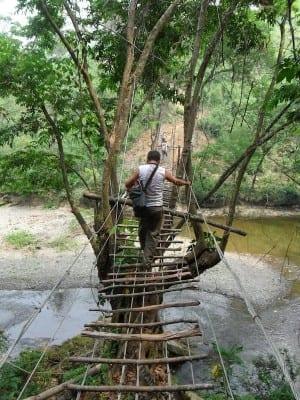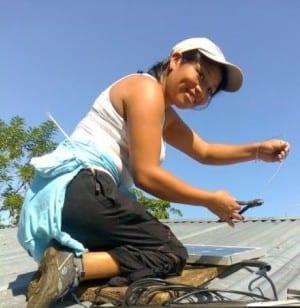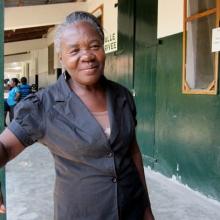The Tula Foundation is a hidden gem within the Canadian philanthropic community. Headquartered at Heriot Bay on Quadra Island, Tula’s Hakai initiative undertakes a range of ground-breaking environmental, science and leadership programming on BC’s Central Coast, while TulaSalud addresses primary health systems and nursing in rural and indigenous regions of Guatemala.
Below, in light of PIH co-founder Dr. Paul Farmer visiting Vancouver this week, Tula co-founder Eric Peterson reflects on the philosophical underpinning for TulaSalud’s work, and how lessons can be broadly applied.

A TulaSalud community health worker on his rounds.
Eric Peterson
The work of Paul Farmer and Partners In Health directly inspired my work in Central America.
In the 1960s, I visited Central and South America as a teenaged backpacker. I fell in love with rural Guatemala and its people. Then, from afar, I watched in sorrow as the country descended into a 30-year civil war and genocide. But peace accords were signed in 1996 and by the early 2000s there was hope for redemption.
Two things came together for me at that time: I sold Mitra, my medical imaging and health systems company, which in turn allowed me to start the BC-based Tula Foundation. At Mitra we’d addressed the needs of advanced countries in North America, Europe, and Asia. With the inception of Tula, I turned my attention to low-income countries.
For me, the obvious place to work was Guatemala. Less obvious was how to get started. I received a lot of “expert” advice I really didn’t want to hear—warning me about getting too entangled and of the need for a clear “exit strategy.”
Who better for me to meet and emulate than Paul Farmer and Partners In Health?
I heard about Dr. Farmer quite by chance. Mitra’s most important hospital partner had been Boston’s Brigham and Women’s Hospital. When I outlined my plans for Tula to my friends at the hospital, they told me about their legendary colleague Dr. Farmer who had immersed himself in rural Haiti, apparently without fretting about entanglements or exit strategies.
I sensed a kindred spirit, so I walked up the street to the then tiny Partners In Health office. It only took that one meeting to confirm that the Tula Foundation was on the right path in Guatemala. I certainly owe a debt to Dr. Farmer and PIH. They set the bar for rural health care—affordable, effective, inclusive—and we strive to maintain their high standards.

Karla, a TulaSalud field technician.
Eric Peterson
We’ve now worked for over 13 years in rural, indigenous Guatemala. The lessons I’ve drawn from Dr. Farmer’s example have been:
- Commit to the long term.
- Work within the public health system.
- Consider equity, justice, and social determinants of health.
- Listen; foster community leadership; draw on the wisdom of local professionals, educators, community health workers, and traditional practitioners.
We’ve helped our Guatemalan colleagues build public health systems in rural, indigenous parts of the country. We’ve focused on nurses, community health workers, and mobile technology to support them and regional public health management. A priority has been maternal, newborn, and child health. Among other things, we’ve graduated roughly 1,500 community nurses via distance education.
We know the value of our work, but it was satisfying to have it affirmed via a recent award of $7.6 million over five years from the federal government (Global Affairs Canada). I can trace everything back to that chance meeting in Boston in 2002.
I am therefore truly honored that the Tula Foundation has been asked to convene a Vancouver gathering of local leaders to meet with Dr. Farmer. In addition discussing Partners In Health’s work, we’ll consider how the PIH approach can inform ours in regard to the health of First Nations and underserved urban communities—two areas where British Columbia faces challenges but also has great opportunities for progressive thinking and innovation.
